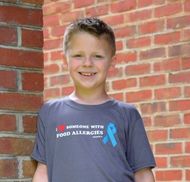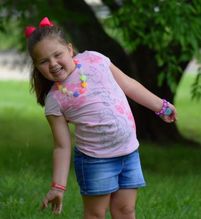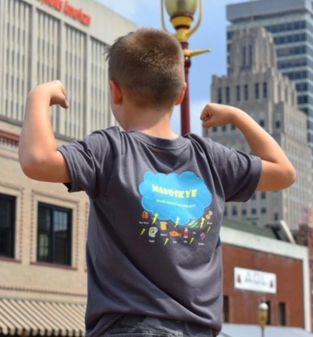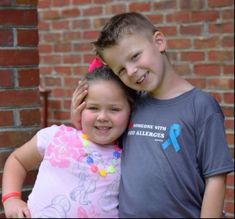He also always beelines for the muddiest puddles, he cries when there’s water in his eyes, and he’s terrified of bee stings. And he is really truly unbelievably kind to his baby sister. And then there are moments when time cracks open in a ray of opalescent light, like one recent morning at our place of worship, when the teacher asked for volunteers and there he was, catapulting over the stairs, and next, in an elegant ellipsis of poised stutters and vowels, and in the most deliberate of tiny voices, he read a paragraph aloud about a man that found G-d by gazing at the stars. This kid, who we couldn’t even afford to send to preschool. He’s also beautiful: shaggy hair, big hazel eyes, the paws of a miniature quarterback. And, like one in thirteen kids among him, he has life-threatening food allergies.
It is not only fear of the hard end line potentiality of food allergies, anaphylaxis, that loops through the consciousness of almost all allergen families, but the cavalier nature of reactions themselves. The standard reaction is one or more of the following: hives, swelling, violent, mucousy white projectile vomiting, itchy tongue, throat, and mouth, difficulty breathing, drop in blood pressure -- and the odd and terrible (not unlike many of my son’s favorite dinosaurs, which I only add because I imagine he’d appreciate the mention)-- sensations of profound doom. The signs can be violent, sometimes erratic, literally as incorrigible as the devil: my son finds a stray sesame seed on his bagel, has a momentary itchiness of throat, then two hours later spikes a high note fever and vomits all through the night. The next day he is articulate, sweet as always, but wheezy, and his energy vaporous. Then, for the next two days he acts quiet and vacant, his body easily breathless, and we tend to him with albuterol treatment, quietly poised to call 911.
A retired labor and delivery nurse once told me, squinting into my face while rage seemed to literally run out the sides of her eyes: “How dare they take away peanut butter and jelly lunches, the most beloved food of all children?” Verbatim. And then: “How many people die of food allergies a year in anyhow? Four? Five? That’s nothing.” The number in fact being in the hundreds, a statistic best reflective not of its potential for fatality, which is very real, but rather the eternal vigilance of preventative care. A detail sometimes lost in the mix of general misinformation. My former sister-in-law once, for example, took my son out of her car and placed him heavily on the floor with a slap of his epinephrine to say "Fuck his epis. I’m not taking him with me anymore." And then in an exhale of anger: “Fuck your allergists. He doesn’t need them.”
To them, to the others who hiccup down tunnel-vision passages of “well that’s not my child,” I ask, but what if it was? What if it was your child that you saw swollen and struggling to breathe and were forced to confront the question “is this it?,” had to inject a needle in a swoop to the thigh, to next ride in an ambulance with a smirky non-plussed paramedic through 20 minutes of heavy traffic otherwise averted if the driver had just put the siren on, hating yourself for not demanding it while your child's eyes roll forward and back, finally dragging the paramedic back who responds with the resistance of a wet cat to check on your child and then condescendingly states; “He’s fine. Kids always get hyper from the epi.” “But he’s not hyper. He’s – “; cut-off to discover at the ER that your child may have gone biphasic and now has a collapsed right lung –.
Or another occasion, when your six year old wakes you up in the middle of the night, screaming between pitches of croup, and you run into the bathroom to see him trying to throw up, face red, wheezing, revelation hitting like a meteor “oh my G-d he’s having a delayed reaction,” and the first round of epinephrine and three puffs of asthma medication only subtly work, until the paramedics arrive oxygen tank in tow, “we’ve got this mom,” and in a blink you are in the back of the ambulance again, but this time it’s a year later, and past midnight, and a young paramedic with powder blue eyes and a thick Philadelphian accent holds your son’s quivering hands (a side effect of the medication) while he still wheezes strider breathes, and he calms him down talking about video games and basketball (“he’s a daddy too), all the time your son’s eyes bursting with bigness over the nebulizer mask, an image burned like an arson into your heart. Hours later there is a formal diagnosis: throat constriction, definitive ANA, conclusively made after a second shot of epi is given hours later into the already dead late night, and only after then, does the wheezing finally, finally subside. The source remains idiopathic, unknown.
And then the following days of guilt and your little person continuing to mentally roll around the perception of their own mortality like it was some marble half smashed in their hand, acting out with childish misdemeanors because Christ, they’re five, because where in the world are the words they might have for what happened, and so they're breaking things and not smiling for seven days straight and will not, adamantly will not be hugged. And you, mom, or emotionally repressed dad, are vanquished. Because no one else understands the particular treasure of this child like you do. The bravery. The unreal courageousness of that body, that tiny-housed soul.
When we returned from the hospital after our first stay, my son insisted I make a cut out of his hand and glue it to the wall with a message splayed across the palm, stating, “I am grateful.” The episode had been around Thanksgiving, and as one can imagine, nothing exemplified the feelings of immense love and gratitude more than the semiotics of that little paper hand. For my son had indeed brushed against death during that episode, he told me so himself while holding his throat and asking, “where did grandpa go again? That’s right, Heaven. That’s where I’m going right now;” shortly later crumpling on his bed.
For the most part, we have been blessed by a community village that if not fully comprehending the nuances of food allergies, genuinely tries, and cares. And for that we are immensely thankful. But sometimes, it seems there is still so much unfortunately willful ignorance. And when someone says something callous at best and pathological at worst, and murder and fear tighten my heart; or alternately something so absurd it literally stings my mouth to respond – (because he is little, and who else does he have but me to come to his defense) -- I stop, and instead think of him objectively, and in reverse, seen far away like a brilliant star found at the end of a telescope.
I imagine him and his honey smell and his perfect little fingers, as he pages through a well-worn book. And I imagine, if one were to ask him his opinion on these things, about the people who seem to think the parents of these literally millions of diagnosed children are just being dramatic, or who simply just don’t care, strangers who buttress themselves with narratives like “keep your kids at home,” “helicopter parenting,” or the markedly heinous, “it’s nature’s way of thinning the herd”-- I know in a heartbeat, for he is heart of my heart, how he would respond. It would be with one simple word: “Therizinosaurus.” Evolve. Dig deep.







 RSS Feed
RSS Feed
